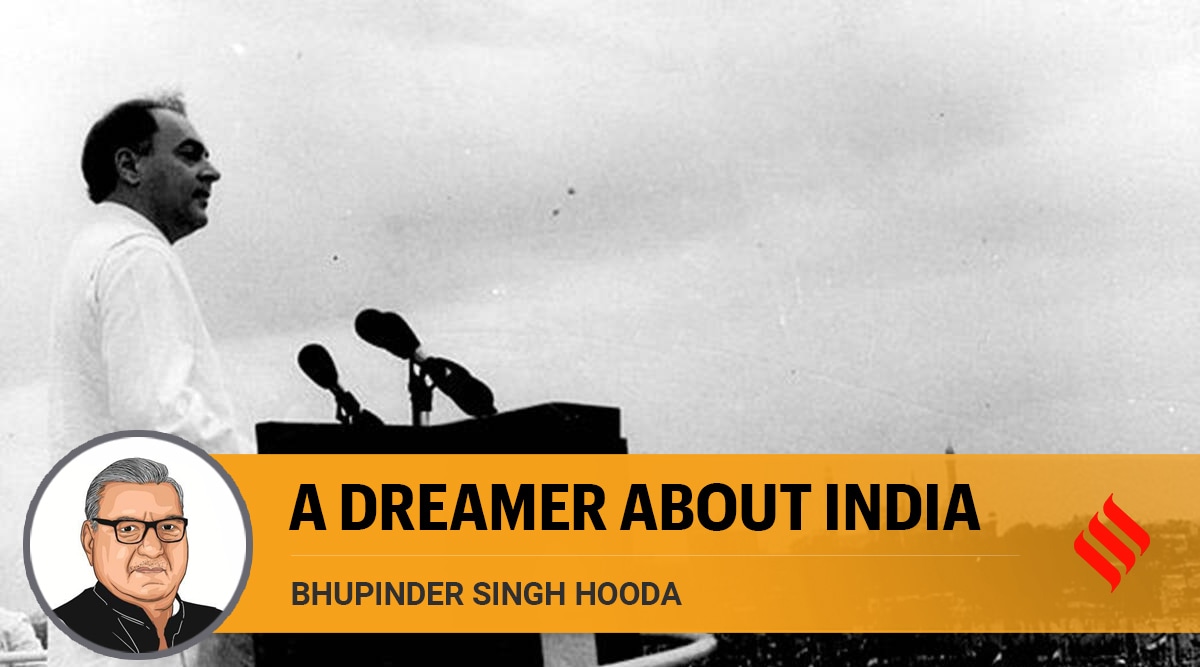 Prime Minister Rajiv Gandhi addressing the nation from the ramparts of Red Fort, Delhi on August 15, 1989 on the 42nd anniversary of Independence. (Express archive photo)
Prime Minister Rajiv Gandhi addressing the nation from the ramparts of Red Fort, Delhi on August 15, 1989 on the 42nd anniversary of Independence. (Express archive photo)Rajiv Gandhi was not an ordinary leader. At the age of 40, he became the youngest Prime Minister of India, blessed with the ability to recognise our challenges and opportunities as a nation. In just seven years, from 1984 to 1991, he left an indelible mark on us as a nation.
Recently, the entire nation celebrated the election of Droupadi Murmu as India’s first tribal woman President. The credit for this goes to Rajiv Gandhi’s vision. He dreamt of decentralising power by giving constitutional status to Panchayati Raj Institutions (PRIs). President Murmu started her political journey as a councillor from Rairangpur in Odisha. The seat was reserved for tribal women. Today, she has risen to the highest position in the country.
Rajivji was of the view that a participative and democratic system of government would unleash enormous energy and bring a revolutionary change in the status of the marginalised sections of society. The Panchayati Raj and Nagar Palika Bills were watershed moments in our collective efforts toward inclusive political growth. Their architect was Rajivji, who also gave a boost to faster delivery of justice through Lok Adalats.


The task to empower people through PRIs was not easy but he did not give up. Aware of the rampant corruption in the country — he had famously said that of every rupee spent by the government, only 15 paisa reaches the intended beneficiary — Rajivji introduced the 64th Constitutional Amendment Bill in the Lok Sabha in 1989, which provided for local-self governance. The Lower House passed the Bill but it was defeated in the Rajya Sabha. Determined to empower people at the grass roots, he incorporated the point of empowering PRIs in the Congress manifesto for the 1991 Lok Sabha elections. I was a Lok Sabha MP when his dream was fulfilled with Parliament enacting the 73rd and 74th Constitutional Amendment Acts. These Acts paved the way for reserving seats for women in panchayats, three-tier panchayats and municipalities in rural and urban areas. Decision-making and financial powers were devolved to these institutions.
Subscriber Only Stories
Even his political opponents agree that Rajivji was a modern leader and receptive to ideas. He could foresee the need for technological modernisation and upgradation for higher productivity, transparency and rapid advancement for social justice. The idea of “Vigyan Gaon Ki Aur” was close to his heart. He championed the cause of aligning technology with agriculture and set up technology missions in various fields including telecommunications, oil seeds and combating illiteracy. Rajivji brought the Department of Personnel and Administrative Reforms under the Prime Minister’s Office (PMO) — this was a watershed moment in the endeavour to improve administrative efficiency in the country.
To check political degeneration, he brought the Constitution (52nd Amendment) Act, 1985, popularly known as the anti-defection law. Imagine the kind of horse-trading of MLAs and MPs that would have been happening if we did not have the anti-defection law. The voting age was lowered from 21 to 18. Rajivji was unequivocal in asserting that the youth should be empowered, educated and skilled to build a social order premised on equality, justice and liberty.
He was equally concerned about the need for cultural synergy to promote brotherhood, tolerance and the spirit of co-existence. This was reflected in his government’s education policy. Seven zonal cultural centres were set up to protect and promote our cultural diversity. The Rajiv Gandhi government established the Ministry of Human Resource Development in 1985 to modernise and expand higher education programmes. Can one forget his monumental contribution to the education of our children through the Jawahar Navodaya Vidyalayas, free residential schools for providing excellent quality education to talented children in rural areas? I can proudly state that the first Jawahar Navodaya Vidyalaya in the country was opened in a village in Jhajjar district, a part of my parliamentary constituency. Currently, there are about 660 JNVs in the country, which need to be expanded to make India truly resilient and inclusive.
I worked closely with Rajivji. He emphasised the importance of morality in public life — all this through consent, conciliation, participation and persuasion. He was a determined peacemaker and worked hard to put an end to the turmoil in Punjab, Assam, Mizoram, Nagaland and Kashmir.
An atmanirbhar India was Rajivji’s ultimate goal. He once said, “India is an old country but a young nation and like the young everywhere, we are impatient. I am impatient, and have a dream. I dream of an India — strong, independent, self-reliant and in the front rank of the nations of the world in the service of mankind.”
India at 75 owes a lot to the leadership of Rajivji. His concept of good governance is reflected in the UN’s Sustainable Development Goals (SDGs). By following his ideals, we can build an India where every one is cared for, without discrimination. A happier, healthier, inclusive and prosperous India would be an apt tribute to him.
The writer is a former CM of Haryana and a senior Congress leader